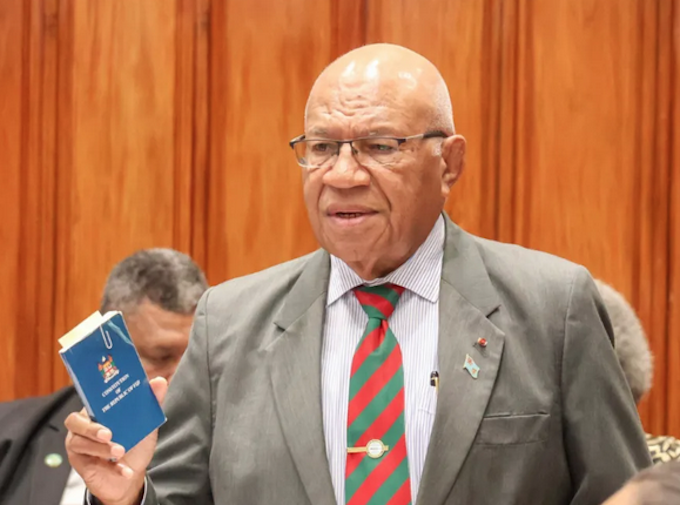
By Kelvin Anthony, RNZ Pacific digital/social lead
Fijian Prime Minister Sitiveni Rabuka has hinted that the country may “hold its first-ever referendum” following a landmark Supreme Court opinion aimed at amending the 2013 Constitution.
On Friday, the nation’s highest court ruled that thresholds for constitutional amendments should be lowered — requiring only a two-thirds majority in parliament and a simple majority of voters in a referendum.
The ruling followed a three-day hearing in August, after Rabuka’s Cabinet, in June, had sought clarification on making changes to parts of the Constitution.
Submissions came from the State, seven political parties, the Fiji Law Society, and the Fiji Human Rights and Anti-Discrimination Commission.
Rabuka said that the Supreme Court’s opinion established a “clear and democratic pathway” for his government’s constitutional reform efforts.
“This opinion provides clarity on matters of constitutional law and governance. It will now go before Cabinet for further deliberation, after which I, as Head of Government, will announce the way forward,” he said in a statement.

However, the Fiji Labour Party, while welcoming the Supreme Court’s opinion, expressed concerns over the lowering of the current “75 percent double super majority requirement” to amend the constitution.
Fijians of Indian descent make up just over 32 percent of Fiji’s total population.
Indo-Fijians ‘particularly vulnerable’
Labour leader and former Prime Minister Mahendra Chaudhry said that the Indo-Fijian community felt “particularly vulnerable” due to the nation’s race-based political tensions, which have resulted in four coups.
He noted that the coalition’s “unwillingness to spell out the constitutional changes it was contemplating” had made Indo-Fijians “apprehensive”.
“It is for this reason that Labour had submitted that constitutional changes should be left to political negotiations with a view to achieving consensus, and stability,” he added.

But Rabuka dismissed Chaudhry’s concerns on Monday, saying that his “argument does not stand”.
“In a referendum, every community is part of the decision. Indo-Fijians, like all other minority groups, vote as equal citizens,” he said.
He said that any government wanting to change the constitution would need support from the whole nation.
“This forces proposals to be fair, broad, and inclusive. Discriminatory ideas would never survive such a test.”
‘Generalised statements’ criticised
Rabuka said Chaudhry should refrain from making “generalised statements”, adding that he does not have the mandate to speak for all Indo-Fijians.
“Chaudhry says change should only come through political negotiations and consensus. But that usually means a few leaders making deals in closed rooms. That gives a small group of politicians’ veto power over the entire country, blocking needed changes and leaving Fiji stuck,” he said.
“A referendum is the opposite of backroom politics. It is open, transparent, and gives the final say to the people themselves. That is real democracy. That is what the Coalition Government welcomes entirely.”
While Rabuka’s People’s Alliance Party wanted the 2013 Constitution thrown out and replaced with the previous 1997 Constitution, he said the former Prime Minister should “move past the old style of politics and recognise that Fiji may now hold its first-ever referendum”.
“That would be a historic step, one that strengthens democracy for every community, not weakens it.
“As your Prime Minister, I give my assurance to all Fijians that this process belongs to you.”
When Voreqe Bainimarama walked out of Parliament after his government lost by a single vote on Christmas Eve in December 2022, he told reporters who swarmed around him in the capital, Suva: “This is democracy and this is my legacy [the] 2013 Constitution.”
Visibly shellshocked
His most trusted ally Aiyaz Sayed-Khaiyum, looking visibly shellshocked at FijiFirst’s loss of power, said at the time: “We hope that the new government will adhere to the rule of law.”
Sayed-Khaiyum is widely viewed as the architect of the 2013 Constitution, although he disputes that claim.
Critics of the document, which is the country’s fourth constitution, argue that it was imposed by the Bainimarama administration
Meanwhile, the country’s chiefs want the 2013 Constitution gone. In May, the Great Council of Chiefs (GCC) unanimously rejected the document as “restricting a lot of work for the iTaukei (indigenous Fijians)”.
Following the Supreme Court opinion, the head of of GCC told local media that the 2013 Constitution lacked cultural legitimacy and undermined Fiji’s democratic capacity.
This article is republished under a community partnership agreement with RNZ.














































